Methodical vs. Analytical — What's the Difference?
By Tayyaba Rehman & Urooj Arif — Updated on March 12, 2024
Methodical approaches involve systematic, organized procedures, while analytical approaches focus on detailed examination and breaking down complex information into understandable parts.

Difference Between Methodical and Analytical
Table of Contents
ADVERTISEMENT
Key Differences
A methodical approach is characterized by a systematic, organized, and often step-by-step process aimed at achieving a task or solving a problem. It emphasizes orderliness and adherence to established procedures, ensuring tasks are completed efficiently and thoroughly. On the other hand, an analytical approach emphasizes critical thinking, problem-solving, and the detailed examination of complex subjects or data. Analytical methods involve dissecting information into smaller, manageable parts to understand the underlying principles or relationships.
Methodical strategies are particularly effective in contexts where consistency, precision, and following a proven workflow are crucial. For example, a methodical approach to software development might involve strictly following a development lifecycle, ensuring each phase is completed before moving to the next. Analytical approach is valuable in scenarios requiring deep understanding, innovation, and the ability to identify underlying patterns or causes. For instance, an analytical approach in market research might involve examining consumer behavior data to identify trends and insights that inform marketing strategies.
While methodical approaches are grounded in following established patterns or protocols, analytical approaches are more about exploration and understanding the nuances of a subject or problem. A methodical person might excel in environments with clear rules and procedures, such as in administrative or operational roles, whereas an analytical person might thrive in roles that require interpreting data, strategic planning, or research, where the ability to dissect and understand complex information is key.
The distinction between methodical and analytical approaches often lies in the nature of the task at hand and the desired outcome. In some cases, a combination of both approaches is necessary; a methodical framework can provide a structured way to tackle a problem, while analytical skills can offer deeper insights and innovative solutions within that framework.
Despite their differences, both methodical and analytical skills are essential in various fields and complement each other in problem-solving. A methodical approach ensures organization and efficiency, while an analytical approach provides depth and understanding, making them both valuable in their own right.
ADVERTISEMENT
Comparison Chart
Focus
Systematic and organized procedures.
Detailed examination and breakdown of information.
Strengths
Consistency, precision, adherence to protocols.
Critical thinking, problem-solving, understanding complex information.
Ideal Uses
Tasks requiring orderliness and efficiency.
Scenarios needing deep understanding and insight.
Skillset
Organized, procedural, detail-oriented.
Critical thinking, problem-solving, data analysis.
Outcomes
Efficient completion of tasks, reliability.
Deep insights, innovative solutions, understanding patterns.
Compare with Definitions
Methodical
Following an organized procedure.
Her methodical approach to data entry minimized errors.
Analytical
Emphasizes critical thinking.
His analytical approach to problem-solving helped identify the root cause of the issue.
Methodical
Emphasizing systematic processes.
The scientist's methodical experiment setup ensured reproducible results.
Analytical
Involves breaking down complex information.
Her analytical skills were crucial in deciphering the dense legal documents.
Methodical
Involves step-by-step execution.
He tackled the complex project with a methodical plan, ensuring each phase was completed before moving to the next.
Analytical
Focuses on detailed examination.
The analyst's detailed examination of market trends led to valuable insights.
Methodical
Ensures consistency and precision.
The chef's methodical preparation contributed to the restaurant's high-quality dishes.
Analytical
Drives innovation and insight.
Analytical thinking in design led to a groundbreaking new product concept.
Methodical
Relies on established patterns.
The accountant's methodical financial audits helped maintain the company's fiscal integrity.
Analytical
Aids in understanding underlying principles.
Analytical chemistry involves understanding the principles behind chemical reactions.
Methodical
Arranged or proceeding in regular, systematic order
Methodical instructions for assembly.
Analytical
Of or relating to analysis or analytics.
Methodical
Orderly and systematic in habits or behavior
A methodical and painstaking researcher.
Analytical
Expert in or using analysis, especially in thinking
An analytic mind.
An analytic approach.
Methodical
In an organized manner; proceeding with regard to method; systematic.
Analytical
Dividing into elemental parts or basic principles.
Methodical
Arranged with regard to method; disposed in a suitable manner, or in a manner to illustrate a subject, or to facilitate practical observation.
The methodical arrangement of arguments; a methodical treatise
Analytical
Reasoning or acting from a perception of the parts and interrelations of a subject
"Many of the most serious pianists have turned toward more analytic playing, with a renewed focus on the architecture and ideas of music" (Annalyn Swan).
Methodical
Characterized by method and orderliness;
A methodical scholar
Analytical
(Logic) Following necessarily; tautologous
An analytic truth.
Analytical
Using, subjected to, or capable of being subjected to a methodology involving algebra or other methods of mathematical analysis.
Analytical
Proving a known truth by reasoning from that which is to be proved.
Analytical
(Linguistics) Expressing a grammatical function by using two or more words instead of an inflected form
Vietnamese is an analytic language.
Analytical
Of or pertaining to analysis; resolving into elements or constituent parts
An analytical experiment
Analytical
Using analytic reasoning as opposed to synthetic.
An analytical mind
Analytical
Of or pertaining to analysis (definition 2).
Analytical
Of a proposition; necessarily true independent of fact or experience, such as "all spinsters are unmarried". Opposite of synthetic.
Analytical
Exercising or involving careful analytical evaluations; as, analytic reasoning; an analytical discussion.
Analytical
Capable of or given to analyzing; - of people.
Analytical
Using or skilled in using analysis (i.e., separating a whole--intellectual or substantial--into its elemental parts or basic principles);
An analytic experiment
An analytic approach
A keenly analytic man
Analytical reasoning
An analytical mind
Analytical
Of a proposition that is necessarily true independent of fact or experience;
`all spinsters are unmarried' is an analytic proposition
Common Curiosities
How do methodical and analytical skills complement each other?
Methodical skills ensure tasks are approached with organization and precision, while analytical skills allow for deep understanding and problem-solving, making them complementary in various professional and academic contexts.
What is an analytical approach?
An analytical approach involves critical examination and breaking down complex information or problems into smaller, understandable parts to gain deep insights and understanding.
What does methodical mean?
Methodical refers to a systematic, organized approach to tasks or problem-solving, often following a specific procedure or set of rules to ensure efficiency and thoroughness.
Can a person be both methodical and analytical?
Yes, individuals can combine methodical and analytical skills, using systematic procedures to organize their work while also applying critical thinking to understand complex issues deeply.
Can methodical strategies improve learning?
Yes, methodical strategies, such as systematic study plans or organized note-taking, can enhance learning by making the process more structured and efficient.
How does an analytical approach enhance research?
An analytical approach enhances research by allowing researchers to critically examine data and information, identify patterns, and derive meaningful conclusions that contribute to knowledge.
Why is a methodical approach important in project management?
A methodical approach in project management ensures that projects are planned, executed, and completed in an orderly, efficient manner, adhering to established timelines and protocols.
How do analytical skills benefit decision-making?
Analytical skills benefit decision-making by enabling individuals to dissect complex information, weigh options critically, and make informed choices based on thorough analysis.
What role do analytical skills play in technology fields?
In technology fields, analytical skills are crucial for problem-solving, developing innovative solutions, and understanding complex systems and data.
Is a methodical approach suitable for creative tasks?
While creative tasks often benefit from flexibility, a methodical approach can provide a structured framework within which creativity can flourish, especially in complex projects.
Why are analytical abilities valued in leadership?
Analytical abilities are valued in leadership because they enable leaders to assess situations critically, foresee potential challenges, and devise strategic solutions.
Can analytical thinking lead to overanalysis?
Yes, excessive reliance on analytical thinking can sometimes lead to overanalysis, where one gets caught up in the details and complexities, potentially hindering decision-making.
How can a methodical approach be applied in daily life?
A methodical approach can be applied in daily life through organizing tasks, setting clear goals, and following a structured routine to improve efficiency and achieve objectives.
How do methodical and analytical approaches differ in problem-solving?
In problem-solving, a methodical approach focuses on following systematic steps to resolve an issue, while an analytical approach emphasizes understanding the problem's intricacies to find a solution.
How can one develop methodical and analytical skills?
Developing methodical and analytical skills involves practice, such as organizing tasks, engaging in critical thinking exercises, and applying these approaches to various challenges and learning opportunities.
Share Your Discovery

Previous Comparison
Scholarship vs. Subsidy
Next Comparison
Limbo vs. AfterlifeAuthor Spotlight
Written by
Tayyaba RehmanTayyaba Rehman is a distinguished writer, currently serving as a primary contributor to askdifference.com. As a researcher in semantics and etymology, Tayyaba's passion for the complexity of languages and their distinctions has found a perfect home on the platform. Tayyaba delves into the intricacies of language, distinguishing between commonly confused words and phrases, thereby providing clarity for readers worldwide.
Co-written by
Urooj ArifUrooj is a skilled content writer at Ask Difference, known for her exceptional ability to simplify complex topics into engaging and informative content. With a passion for research and a flair for clear, concise writing, she consistently delivers articles that resonate with our diverse audience.















































